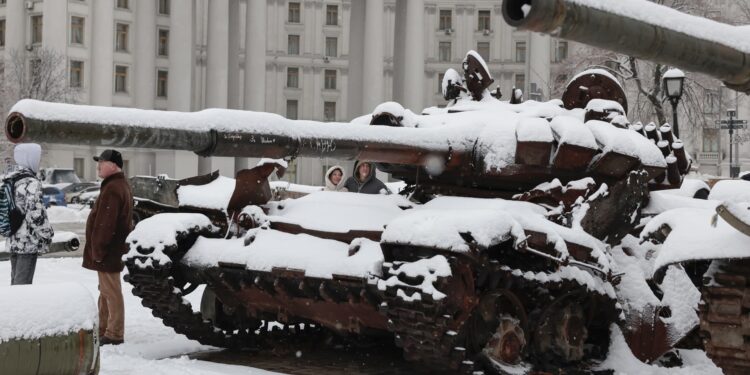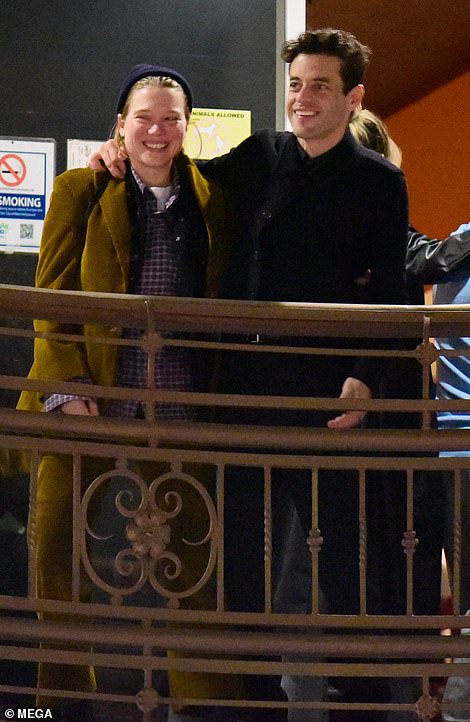Destroyed Russian vehicles and tanks at Mikhaylivska Square on November 19, 2022 in Kyiv, Ukraine. Millions of Ukrainians are facing severe energy disruptions after recent waves of Russian missile and drone strikes have left nearly half of Ukraine’s energy infrastructure crippled and in need of repair, as temperatures plummet.
Jeff J Mitchell | Getty Images News | Getty Images
US Director of National Intelligence Avril Haines said on Saturday that Russian forces in Ukraine are burning munitions faster than the country’s defense industry can replace them.
Russia is using up the munitions “very quickly,” prompting Moscow to look to other countries for help, including North Korea, Haines told NBC News’ Andrea Mitchell at a panel at the Reagan Defense Forum in Simi Valley, California.
Asked how quickly Russia used up ammunition, Haines said, “I don’t think I can give you exact numbers on this forum. But very quickly. I mean, it’s really extraordinary.”
She added, “Our sense is that they are unable domestically to produce what they are spending at this stage.
So this will be a challenge.”
The Pentagon said last month that Russia is firing 20,000 artillery rounds a day, even as it suffers a series of setbacks on the battlefield. Echoing previous statements by Biden administration officials, Haines said Russia is using precision munitions faster than its conventional munitions.
The Biden administration said earlier that Russia had resorted to North Korea to secure more supplies of artillery ammunition. The amount of assistance provided by North Korea appears limited, Haines said, but this is something the intelligence community will continue to monitor closely.
“We indicated that we had seen some movement, but it wasn’t much at this point,” she said of North Korea’s role.
The looming shortage of ammunition was just one of a number of challenges facing the Russian military, Haines said, citing problems with morale and logistics as well.
The intelligence chief said that the tempo of the war in Ukraine seemed to slow down with the onset of winter and that both armies would try to reorganize and group for more fighting in the spring. But she said the intelligence community had “a fair amount of skepticism” that Russian forces would be sufficiently prepared for renewed clashes in March.
Haines said that Russian President Vladimir Putin was “surprised” by the disappointing performance of his military after the invasion of Ukraine in February.
“I think he’s becoming more familiar with the challenges the military faces in Russia,” Haines said. “But it’s still not clear to us that he has a full picture at this point of the extent of the challenge they face.”
Putin has not changed his political goal to effectively control Ukraine, Haines said, but it is unclear whether he would accept curtailed military ambitions.
“I think our analysts would say he may be willing to do that on a temporary basis with the idea that he may then come back on this issue at a later date,” she said.
Although the recent protests do not pose a serious challenge to Putin’s hold on power, criticism of the war’s management within Russia has been mounting from political figures, and this may affect his decision-making on the conflict, according to Haines.
“I think it’s fair to say that, from our point of view, Xi’s vote on this will be, obviously, among Putin’s most persuasive votes on this issue,” Haines said.
“I think it’s fair to say that, from our point of view, Xi’s vote on this will be, obviously, among Putin’s most persuasive votes on this issue,” Haines said.
China and Tik Tok
Regarding recent protests in China against COVID-19 quarantine rules, Haines said public displays of anger did not pose a threat to public stability or the survival of the regime. But, she said, “how he develops will be important to Xi’s status.”
Haines said the widespread protests contradict the Chinese government’s narrative about how the country can operate more smoothly than more chaotic democracies, and Covid-19 restrictions have negatively affected the Chinese economy.
She said that despite the challenges of having to balance containing the virus, addressing public anger over quarantine protocols and ensuring economic growth, Xi was “unwilling to take a better vaccine from the West”.
The US intelligence director, the first woman to hold the post, said there are good reasons to be concerned about the Chinese company Tik-Tok.
When asked if parents should be concerned about their children using the popular video platform, Haines said, “I think you should be.”
China is developing frameworks to collect foreign data and has the potential to “change that and use it to target audiences for media campaigns or other things, but also to get it in the future so they can use it in a variety of means that they’re interested in,” Haines said.
FBI Director Christopher Wray recently warned that he had serious concerns about Tik-Tok, saying the Chinese government could use it to collect data on millions of users or to control its recommendation algorithm, which could be used to influence public opinion on purpose.
Haines said that more than two months of women-led protests in Iran have been “fantastic” but that the Iranian regime does not see the unrest as an imminent threat to staying in power. However, she said a deteriorating economy and protests over time could fuel unrest and instability.
The IRGC and Iran’s intelligence services have adopted an “extraordinarily aggressive” stance targeting critics at home and abroad, according to Haines.
Haines’ office is overseeing an assessment of potential national security risks from the disclosure of documents taken from former President Donald Trump’s Mar-a-Lago home. But she and other intelligence officials declined to comment on the case, which is a Justice Department investigation.
NBC News’ Mitchell asked Haines what would happen if an intelligence officer removed classified documents and then resisted turning them over.
After a long pause, Haines laughed and said, “Please don’t do this!”

























